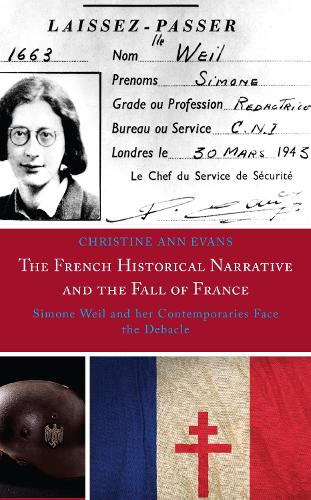
The French Historical Narrative and the Fall of France: Simone Weil and her Contemporaries Face the Debacle
(Hardback)
Publishing Details
The French Historical Narrative and the Fall of France: Simone Weil and her Contemporaries Face the Debacle
By (Author) Christine Ann Evans
Bloomsbury Publishing PLC
Lexington Books
19th July 2022
United States
Classifications
Professional and Scholarly
Non Fiction
940.5344
Physical Properties
Hardback
142
Width 159mm, Height 228mm, Spine 17mm
381g
Description
The fall of France in June 1940, La Dbcle, posed a challenge to France's understanding of itself. Could the existing sacred narrative of French history established by the Third Republic hold in the face of the defeat of Frances military and political systems, both built upon its foundations The French Historical Narrative and the Fall of France: Simone Weil and her Contemporaries Face the Debacle focuses on assessments of the Debacle and places Simone Weil's writings of 1938 to 1943 within this continuum. This study recreates the debate in those fraught years to posit a horizon of expectations within which to place and better appreciate Simone Weils writing of the period, far reaching and bold but hardly crazy (as De Gaulle is said to have characterized her ideas).
Reviews
Dr. Christine Evanss excellent study clarifies the historical backdrop that frames Simone Weils condemnation of the untruths and half-truths contained in the Third Republics sacred history, because, in her opinion, they contributed to the Fall of France in 1940. Innovatively using narrative theory and narrative psychology, Evans presents the manipulative effect of the false version of events. Simone Weil counters this deceit with her impassioned plea in LEnracinement (The Need for Roots) for an honest historical portrayal, essential to constructing a milieu vital that nourishes what is sacred in every person. Evans conclusion presciently evokes the two starkly different narratives and visions of the future presently competing in the United States built on 1619 and 1776 as parallels to the debates prior to the fall of France.
-- E. Jane Doering, University of Notre DameDrawing on historiography, literary theory, and narrative psychology, among other fields, Christine Ann Evans's carefully researched, wide-ranging book serves to locate important threads of Simone Weil's thought within the fabric of French history. Weil was an outlier and rebel, fiercely committed to speaking the truth, no matter the consequences. She was also a true servant of "the needs of the soul," one who cared enough about France and its people to give herself over to its cause -- even if that meant repudiating those triumphalist, "sacred" narratives so readily embraced and enshrined. Evans's fascinating story does well to capture both the rebel and the servant, and also sheds valuable light on the deep politics of both historical memory and national identity.
-- Mark Freeman, College of the Holy CrossWritten in a highly engaging and accessible manner, this book shows the riches nested within Simone Weils reflections on history. Offering readers a detailed contextualist study, Evans demonstrates the degree to which Weil engaged insightfully with her contemporaries on French history and effectively challenged complacent national narratives. It is a must-read for all Weil scholars.
-- Sophie Bourgault, University of OttawaAuthor Bio
Christine Ann Evans is professor emerita of comparative literature at Lesley University.
